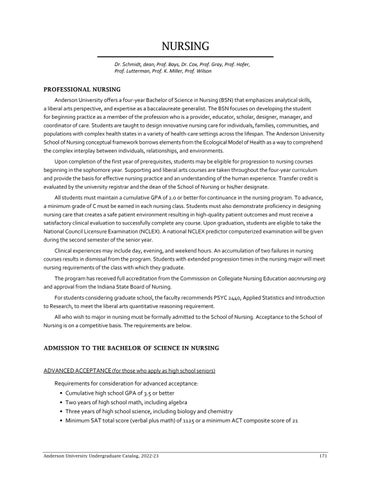NURSING Dr. Schmidt, dean; Prof. Bays, Dr. Cox, Prof. Gray, Prof. Hofer, Prof. Lutterman, Prof. K. Miller, Prof. Wilson
PROFESSIONAL NURSING Anderson University offers a four-year Bachelor of Science in Nursing (BSN) that emphasizes analytical skills, a liberal arts perspective, and expertise as a baccalaureate generalist. The BSN focuses on developing the student for beginning practice as a member of the profession who is a provider, educator, scholar, designer, manager, and coordinator of care. Students are taught to design innovative nursing care for individuals, families, communities, and populations with complex health states in a variety of health-care settings across the lifespan. The Anderson University School of Nursing conceptual framework borrows elements from the Ecological Model of Health as a way to comprehend the complex interplay between individuals, relationships, and environments. Upon completion of the first year of prerequisites, students may be eligible for progression to nursing courses beginning in the sophomore year. Supporting and liberal arts courses are taken throughout the four-year curriculum and provide the basis for effective nursing practice and an understanding of the human experience. Transfer credit is evaluated by the university registrar and the dean of the School of Nursing or his/her designate. All students must maintain a cumulative GPA of 2.0 or better for continuance in the nursing program. To advance, a minimum grade of C must be earned in each nursing class. Students must also demonstrate proficiency in designing nursing care that creates a safe patient environment resulting in high-quality patient outcomes and must receive a satisfactory clinical evaluation to successfully complete any course. Upon graduation, students are eligible to take the National Council Licensure Examination (NCLEX). A national NCLEX predictor computerized examination will be given during the second semester of the senior year. Clinical experiences may include day, evening, and weekend hours. An accumulation of two failures in nursing courses results in dismissal from the program. Students with extended progression times in the nursing major will meet nursing requirements of the class with which they graduate. The program has received full accreditation from the Commission on Collegiate Nursing Education aacnnursing.org and approval from the Indiana State Board of Nursing. For students considering graduate school, the faculty recommends PSYC 2440, Applied Statistics and Introduction to Research, to meet the liberal arts quantitative reasoning requirement. All who wish to major in nursing must be formally admitted to the School of Nursing. Acceptance to the School of Nursing is on a competitive basis. The requirements are below.
ADMISSION TO THE BACHELOR OF SCIENCE IN NURSING
ADVANCED ACCEPTANCE (for those who apply as high school seniors) Requirements for consideration for advanced acceptance: • Cumulative high school GPA of 3.5 or better • Two years of high school math, including algebra • Three years of high school science, including biology and chemistry • Minimum SAT total score (verbal plus math) of 1125 or a minimum ACT composite score of 21
Anderson University Undergraduate Catalog, 2022-23
171

